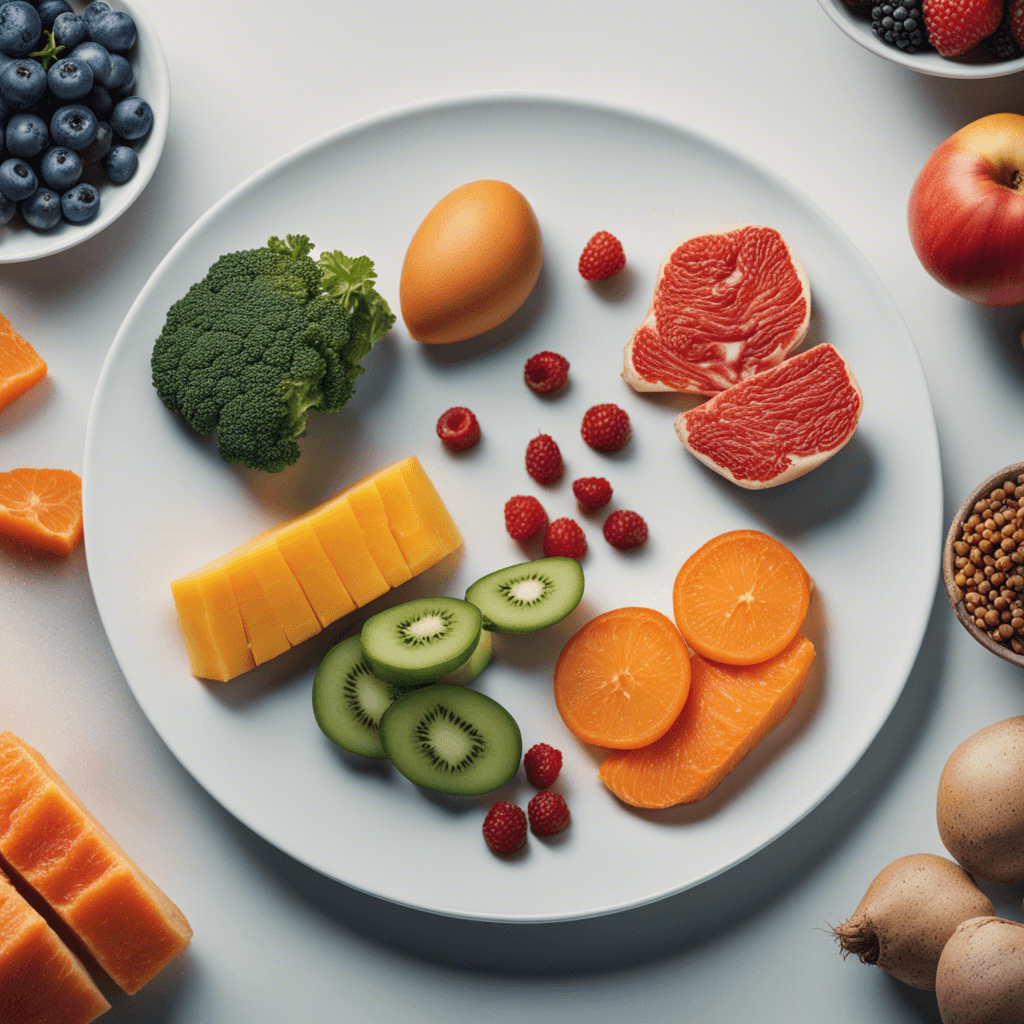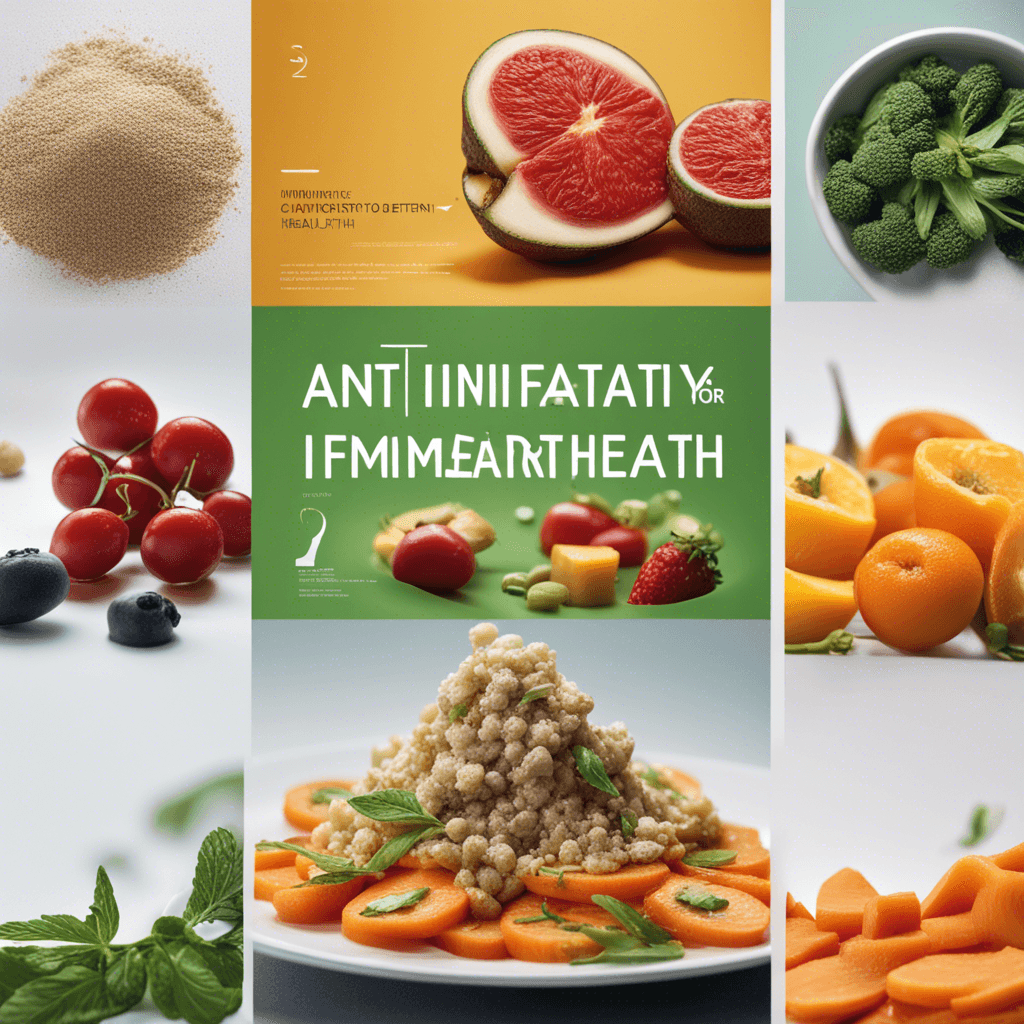The Ultimate Guide to Anti-Inflammatory Diets for Better Health
In today’s fast-paced world, many individuals experience chronic inflammation, which can lead to a myriad of health issues, including heart disease, diabetes, and autoimmune disorders. Understanding the role of diet in managing inflammation is crucial for achieving better health. An anti-inflammatory diet focuses on incorporating foods that reduce inflammation while avoiding those that exacerbate it, allowing individuals to enhance their wellbeing naturally.

Adopting an anti-inflammatory diet not only promotes better physical health but also contributes to mental clarity and emotional stability. The health benefits of anti-inflammatory foods are extensive, and research indicates that they can improve energy levels, enhance mood, and even promote longevity. By learning about the types of foods that combat inflammation and those that trigger it, you can create meal plans tailored to your specific needs and lifestyle. This guide will delve into the essentials of anti-inflammatory diets, offering practical applications, delicious recipes, and expert guidelines to help you reduce inflammation naturally.
Understanding Inflammation and Its Effects
Inflammation is a natural response of the immune system to protect the body from injury, infection, and harmful substances. However, chronic inflammation can lead to severe health problems, including increased risk of chronic diseases. Understanding the effects of dehydration on wellbeing is also essential, as dehydration can exacerbate inflammatory processes, leading to fatigue and other health complications.
Chronic inflammation can result from various factors, including poor diet, lack of exercise, and stress. It’s crucial to recognize the symptoms of chronic inflammation, which may include persistent fatigue, joint pain, and digestive issues. By understanding these factors, individuals can take proactive steps to mitigate their risk and improve their health through an anti-inflammatory diet.
How Chronic Inflammation Affects Health
Chronic inflammation is linked to numerous health disorders, including cardiovascular disease, cancer, and neurodegenerative diseases. It can damage tissues and organs, leading to a decline in overall health. For example, inflammation in the arteries can contribute to atherosclerosis, increasing the risk of heart attacks and strokes.
Moreover, chronic inflammation has been associated with mental health issues such as depression and anxiety. Pro-inflammatory cytokines can affect neurotransmitter function, leading to mood swings and cognitive decline. Understanding these connections emphasizes the importance of maintaining a balanced diet rich in anti-inflammatory foods.
Core Principles of an Anti-Inflammatory Diet
An anti-inflammatory diet centers around whole, nutrient-dense foods that support the body’s healing processes. This involves consuming a variety of fruits, vegetables, whole grains, lean proteins, and healthy fats while avoiding processed foods, refined sugars, and artificial additives. Key guidelines include:
1. **Focus on Whole Foods**: Prioritize fruits, vegetables, whole grains, nuts, and seeds. These foods are rich in antioxidants, vitamins, and minerals that help reduce inflammation. Foods like berries, leafy greens, and fatty fish are excellent choices.
2. **Incorporate Healthy Fats**: Opt for sources of healthy fats such as olive oil, avocados, and fatty fish like salmon. Omega-3 fatty acids found in these foods have been shown to combat inflammation effectively.
Foods to Include
When creating meal plans for anti-inflammatory diets, it’s essential to focus on foods that promote health. Some of the best anti-inflammatory foods include:
- Berries: Blueberries, strawberries, and raspberries are high in antioxidants that help reduce inflammation.
- Leafy Greens: Spinach, kale, and collard greens are packed with vitamins and minerals beneficial for reducing inflammation.
- Fatty Fish: Salmon, mackerel, and sardines are rich in omega-3 fatty acids, known for their anti-inflammatory properties.
Foods to Avoid for Inflammation
Just as important as including anti-inflammatory foods is avoiding those that promote inflammation. Processed foods, refined carbohydrates, and sugary drinks can exacerbate inflammatory responses in the body. Here are some key foods to steer clear of:
1. **Sugary Foods and Beverages**: High sugar intake can trigger the release of inflammatory messengers. Soft drinks and sweets should be limited or eliminated.
2. **Refined Carbohydrates**: White bread, pastries, and other refined carbs can lead to spikes in blood sugar and promote inflammation.
Practical Applications of Anti-Inflammatory Diets
Implementing an anti-inflammatory diet requires planning and intention. Start by creating a weekly meal plan that emphasizes whole, anti-inflammatory foods. Experiment with new recipes, such as quinoa salads loaded with vegetables, or grilled salmon with a side of sautéed kale.
Consider keeping a food journal to track your meals and symptoms. This practice can help identify which foods work for you and which do not. Meal prepping can also be a practical way to ensure you have healthy options available throughout the week.
Best Anti-Inflammatory Recipes
Cooking with anti-inflammatory ingredients can be both enjoyable and rewarding. Here are a few recipes to get you started:
1. **Turmeric Ginger Tea**: A soothing beverage that combines the anti-inflammatory properties of turmeric and ginger, providing a comforting drink that can be enjoyed daily.
2. **Quinoa Salad with Roasted Vegetables**: A nutrient-dense salad featuring quinoa, roasted sweet potatoes, and a variety of colorful veggies drizzled with olive oil and lemon juice.
3. **Baked Salmon with Avocado Salsa**: This dish highlights the health benefits of fatty fish and healthy fats from avocados, making for a delicious and anti-inflammatory meal.
Meal Plans for Anti-Inflammatory Diets
Creating a meal plan can streamline your efforts to adopt an anti-inflammatory diet. Here’s a sample one-day meal plan:
- Breakfast: Overnight oats topped with berries and walnuts.
- Lunch: Spinach and quinoa salad with chickpeas and a lemon-tahini dressing.
- Dinner: Grilled salmon with roasted Brussels sprouts and sweet potatoes.
- Snack: Carrot sticks with hummus.

Frequently Asked Questions (FAQ)
What is an anti-inflammatory diet?
An anti-inflammatory diet is a way of eating that focuses on foods known to reduce inflammation in the body. This includes plenty of fruits, vegetables, whole grains, lean proteins, and healthy fats while avoiding processed foods, sugars, and refined carbohydrates. The goal is to promote health and well-being through dietary choices.
How can I reduce inflammation naturally?
To reduce inflammation naturally, focus on incorporating anti-inflammatory foods into your diet, such as fatty fish, fruits, vegetables, nuts, and whole grains. Avoid inflammatory foods like processed snacks, sugary beverages, and trans fats. Additionally, maintaining a healthy lifestyle through regular exercise, adequate sleep, and stress management can contribute to reducing inflammation.
What are some common foods to avoid inflammation?
Common foods that can promote inflammation include sugary foods and drinks, refined carbohydrates (like white bread and pastries), red and processed meats, and unhealthy fats found in fried foods. Reducing or eliminating these foods can help lower inflammation levels in the body.
Can an anti-inflammatory diet help with weight loss?
Yes, an anti-inflammatory diet can assist with weight loss. By focusing on whole, nutrient-dense foods and avoiding processed items, individuals may naturally reduce calorie intake while promoting better metabolic health. Additionally, many anti-inflammatory foods are low in calories but high in nutrients, making them ideal for weight management.
What are some quick anti-inflammatory meal ideas?
Quick anti-inflammatory meal ideas include smoothie bowls with spinach and berries, avocado toast on whole grain bread, or a simple stir-fry with colorful vegetables and tofu or chicken. Preparing meals ahead of time and having ingredients pre-chopped can also make it easier to whip up nutritious meals quickly.
Conclusion
Embracing an anti-inflammatory diet offers numerous health benefits, from reducing the risk of chronic diseases to improving overall wellbeing. By focusing on whole, nutrient-dense foods and making conscious dietary choices, you can effectively combat inflammation and promote better health. This guide provides essential information, practical meal plans, and delicious recipes to help you embark on your journey toward a healthier lifestyle.
Remember, adopting an anti-inflammatory diet is not just about eliminating certain foods; it’s about embracing a healthier way of eating that nourishes your body and supports your immune system. As you explore these dietary changes, consider incorporating a variety of foods to discover what works best for you and your unique health needs.
Suggested Video Topics
- 5 Easy Anti-Inflammatory Recipes You Can Make at Home
- Understanding the Connection Between Inflammation and Chronic Disease
- Meal Prep for an Anti-Inflammatory Diet: Tips and Tricks


